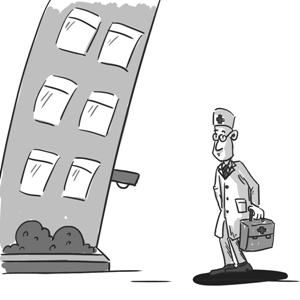Communities need real GPs

Illustration: Chen Xia/GT
In late January, the Shanghai Municipal Commission of Health and Family Planning announced that this year all of the health community centers in the city will introduce a family doctor system. By the end of 2020, every Shanghai resident will have access to the service of a registered family doctor.
Shanghai's new family doctor system was a hot topic during this year's two sessions, the city's annual legislative advisory meetings held last month.
The family doctor system is based on the community. Chinese hospitals are ranked in three levels with community health centers regarded as tier one institutions, district hospitals tier two and teaching hospitals tier three.
Representative Qiu Jian, a professor at Shanghai First People's Hospital, suggested that Shanghai follow the system implemented in many foreign countries, where primary care is provided in the community. If a patient needs further medical diagnosis or treatment, then the family doctor will refer him or her to a specialist or hospital.
At present, Chinese people can go to any hospital to register to see a doctor. Even if they are only affected by a minor ailment, most Chinese people choose to seek treatment at a tier three hospital, which has led to serious overcrowding at hospitals. Qiu's proposal is therefore a worthwhile solution to alleviate the strain on medical resources faced by tier three hospitals.
However, while reporting a story on Shanghai's community health centers last month, I discovered that most of the patients there are elderly. Some of them told me that they go to community health centers because of the cheaper cost of medicine. Regulations stipulate that medicines dispensed at community centers must be sold at the wholesale price; drugs sold at tier two or three hospitals, however, can be marked up by 15 percent.
Younger people who do not suffer from chronic illness and do not have to take medicine regularly, on the other hand, rarely go to community centers. They tend to be skeptical that doctors at community centers will be able to treat them.
I also interviewed Zhu Shanzhu, the chairman of the Society of General Practice, Chinese Medical Association, and the dean of the Department of General Practice at the Shanghai Medical College at Fudan University. An authoritative expert in this field, she told me that in order to earn patients' trust, Shanghai must focus on how to train the family doctors that work at community health centers.
Zhu said that a good family doctor is a general practitioner (GP) - he or she may not have the depth of knowledge and skill that a specialist has but instead is an all-rounder able to provide comprehensive and holistic primary care.
Zhu pointed out that in community health centers, although all the doctors are labeled as GPs, many are further classified by specialty. Some are surgeons, some are pediatricians, and so on. Zhu revealed that even some distinguished national-level GPs are not real GPs. They actually specialize in one field, although not to the same extent as specialists at tier three hospitals.
Zhu added that on paper Shanghai leads the country in implementing a family doctor system. Official statistics showing the number of GPs are impressive and the rate of people registering with community health centers has been rising steadily year after year. But these figures don't tell the whole story.
The purpose of family doctors is to provide primary care to the community. Ideally, people seeking non-emergency treatment will be able to quickly and conveniently consult their family doctor. But if our family doctors are not actually general practitioners, it defeats the purpose of community health centers. This will have to be rectified if officials hope to tackle the serious problem of overcrowding at hospitals.